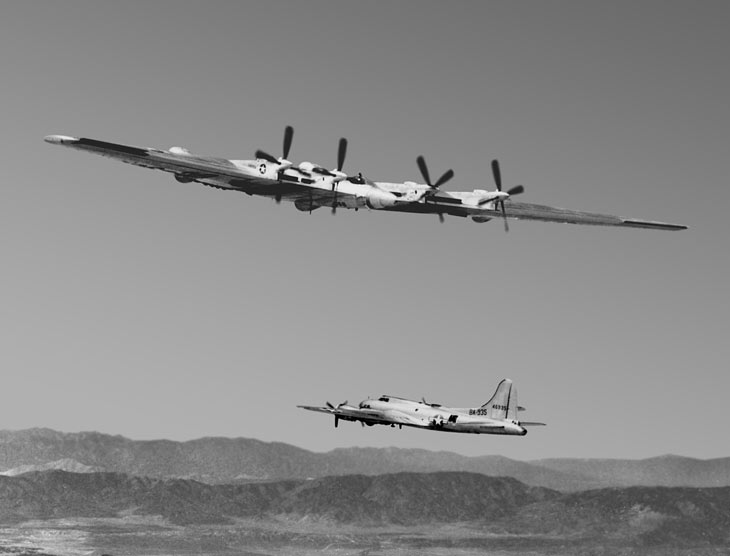Northrop
YB-35
The Northrop YB-35 was an experimental aircraft designed and built
by the Northrop Corporation for the United States Army Air Force.
The YB-35 was a development of several earlier aircraft of similar
design, and was the brainchild of the radical aircraft designer Jack
Northrop.
The YB-35, and the earlier XB-35 and N-9M prototypes, were extremely
advanced for the time. The N-9M first flew back in the middle of World
War 2 in 1942. With the XB-35 following just a few years later.
The YB-35 was envisaged as a long-range bomber capable of attacking
Nazi Germany from bases on the East coast of America. This was in
the event that if Britain fell to the Nazis, America could continue
with their strategic bombing campaign. The 1941 United Stated Army
Air Corps design brief called for a bomber capable of carrying 10,000
lbs (4,500 kgs) of bombs on a round trip mission of 10,000 miles (16,000
kms). Boeing, the Consolidated Aircraft Company, and the Northrop
Corporation were all invited to submit designs.
Boeing and the Consolidated Aircraft Company both opted for conventional
designs, but Northrop went for a flying wing configuration. The prototype
version of the YB-35 was called the XB-35, and was essentially a larger
version of the N-9M. It consisted of a central fuselage to house the
crew embedded within the wing. Six small bomb bays, three in each
wing, carried the offensive payload. While defensive armament was
to be provided by no less than twenty 20mm cannons housed in six turrets.
The aircraft was partially constructed using a new aluminium alloy
which was considerably stronger than that used before.

Despite some issues with the contra-rotating propellers - eventually
substituted for single-rotation propellers, the XB-35 proved the concept
worked, and as a result an order for 13 pre-production Northrop YB-35
aircraft was placed by the USAAF.
The first one did not fly until 15 May 1948. While some Air Force
generals felt the piston engines made the B-35 obsolete, it remained
superior in overall performance and range to its competitor, the Convair
B-36, and General Hoyt Vandenberg wrote that only the B-35 and the
B-36 had adequate range for the Air Force's primary mission of the
time (potential strikes on the Soviet Union), and nothing comparable
would be available until the mid-1950s.
In the end however only the first YB-35 ever flew. The second aircraft
was scrapped before it was finished, while the remaining 11 YB-35s
were heavily modified while still on the production line to test different
jet engine configurations. These aircraft, designated YB-49, suffered
a similar fate, all being scrapped in the coming years. The last being
dismantled in 1953.
In the end the technical problems encountered by using such a radical
design proved to costly and time consuming for the USAAF to continue
funding. Additionally, the more conventional Convair B-36 was proving
to be fit for service with fewer teething problems. |

